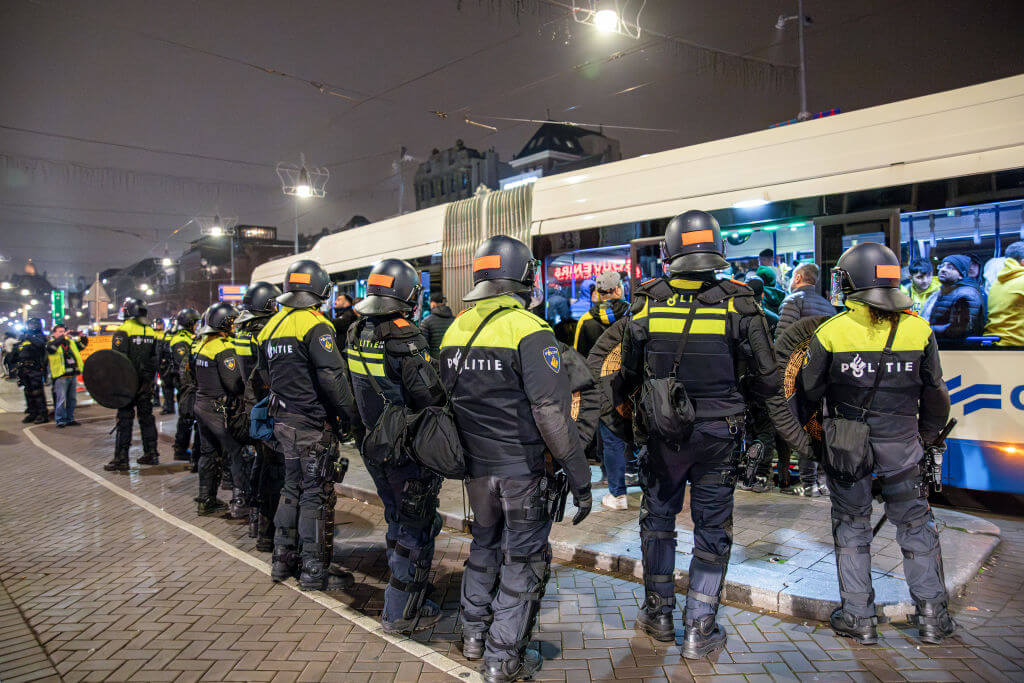A European Jewish leader on Amsterdam violence: ‘A line has been crossed’
Yes, Israeli soccer fans behaved badly before the riot. But that doesn’t justify physical attacks

Dutch police officers stand guard after violence broke out in Amsterdam after a soccer match between Ajax Amsterdam and Maccabi Tel Aviv. Photo by VLN NIEWS/ANP/AFP via Getty Images
Matthijs Schussler was in Brussels when he awoke Friday to news of violent attacks against Israeli soccer fans on the streets of Amsterdam.
“It was shocking,” he said of the Thursday evening riots. “I mean, it wasn’t just one or two incidents, but it happened all over the city.”
The Dutch-speaking Schussler, 42, worked for a large international law firm in Amsterdam before becoming CEO of ELNET’s European Union and NATO office. Working for ELNET, a Europe-based NGO that focuses on strengthening Europe-Israel relations, Schussler is accustomed to Europe’s frequent paroxysms of anti-Israel protests. But this, he said in a phone interview, was different.
“The police had 800 policemen in the street on that night, which for Amsterdam is quite a lot,” he said, “but because of the specific tactics that were used, it was very difficult for the police to to stop this. The scale and the magnitude is unprecedented. It hasn’t happened this way in any European city since the seventh of October.”
The following conversation, about what this attack means and how the Dutch government should respond, has been edited for length and clarity.
Is Amsterdam safe for Jews?
That’s a really tough question. I would say Amsterdam is still safe for Jews, but many Jews feel unsafe, and there is a reason for that. The amount of violence that we saw in the last 24 hours is really unprecedented, and I think that’s really changed something. It’s a trauma for a city that has a huge Jewish cultural heritage and history.
There have been demonstrations and even attacks on Jews across Europe since Oct. 7. What makes this stand out?
What’s so shocking to people is it’s not just a demonstration where people destroy government property, or shout things that are out of line. This was actually targeted and systematic violence against Israeli and Jewish people. And it was also on the night of remembrance of the Kristallnacht, which makes it even more painful.
Who were the attackers?
That was a question posed to the mayor of Amsterdam this morning at a press conference, and the mayor gave the answer that you would expect, saying that this is all under investigation — which the Jewish community in the Netherlands was extremely upset about. They felt people know very well who committed those crimes.
So why the hesitation?
There’s definitely a big problem there, and there is an element of political correctness, of people restraining themselves from calling out what’s actually going on.
And this happened in the city of Anne Frank.
The municipality of Amsterdam is very aware of that, and they do feel there is a special relationship with the Jewish community going back a very, very long time, from the Portuguese Jews to the story of Anne Frank. When we say, “never again,” you know, what does that actually mean, if it can happen again?
How do the reports and videos of Israeli fans shouting anti-Arab chants and tearing down Palestinian flags fit into the narrative of the past 24 hours?
I completely agree with the answer the mayor gave, that there is no excuse whatsoever for what happened later on, and that those are things that should be seen separately from attacks focused on beating up people quite severely. There’s no way that any of that could justify what went on later.
You don’t buy the narrative, which is now common on social media, that there was incitement on the part of the Israeli fans?
I completely don’t agree that one is a reason for the other, because what happened afterwards is just unjustifiable in any way. The amount of violence, and the targeted way it was done, just randomly attacking and beating up Israeli and Jewish Israeli Maccabi Tel Aviv supporters, that’s a completely different category.
How would you like to see authorities handle this so it sends a message across Europe about antisemitism?
A strong signal needs to be sent by enforcing very, very strong sentences. This is really, for Dutch policymakers, a time to wake up and take action. Pro-Palestinian protests have escalated way too often in the past year. In the Netherlands, there’s always been a tradition of freedom of speech, for people to be allowed to demonstrate. And of course, this is a very important right in a democracy.
But I think the feeling for many people, especially also the Jewish community, has been that there was too much room for creating a new normal, which is not normal. And there’s a large responsibility for the authorities to push back and show that there’s limits. There needs to be a realization that a line has been crossed.
A message from our Publisher & CEO Rachel Fishman Feddersen

I hope you appreciated this article. Before you go, I’d like to ask you to please support the Forward’s award-winning, nonprofit journalism so that we can be prepared for whatever news 2025 brings.
At a time when other newsrooms are closing or cutting back, the Forward has removed its paywall and invested additional resources to report on the ground from Israel and around the U.S. on the impact of the war, rising antisemitism and polarized discourse.
Readers like you make it all possible. Support our work by becoming a Forward Member and connect with our journalism and your community.
— Rachel Fishman Feddersen, Publisher and CEO





























